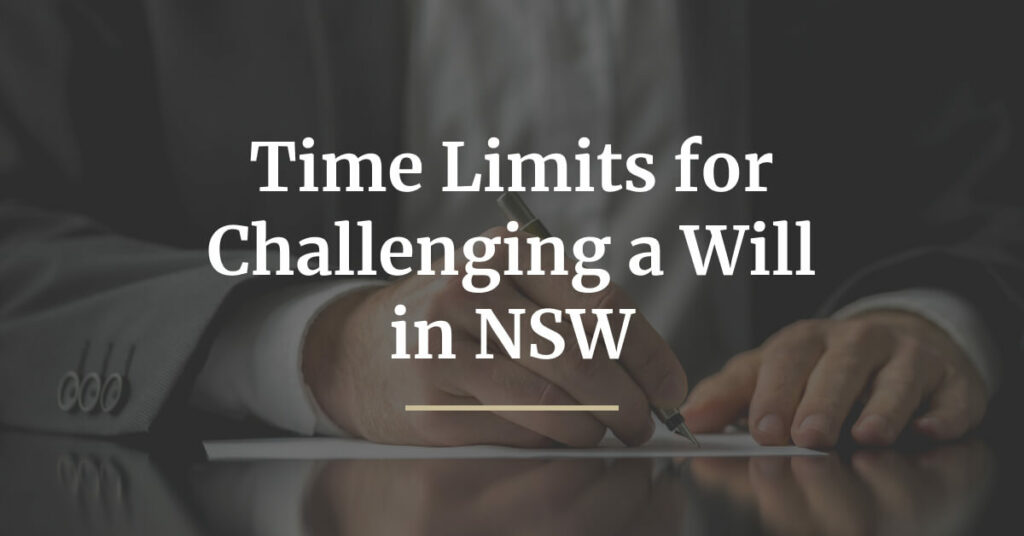Time Limits for Challenging a Will in NSW
The time limit for challenging a will in NSW depends on the facts and circumstances of each case.
Whilst there is no statutory limitation period for challenging a will as there is for contesting a will (also known as a family provision claim), it is important to seek legal advice as soon as possible to provide the best chance of a favourable outcome.
If a person suspects that a loved one was pressured into signing a will, prepared a will under fraud, or after a dementia diagnosis, the person should contact a lawyer as soon as possible to obtain advice.
If an executor obtains probate and is not notified of a will challenge, there is a risk the executor may distribute the estate assets reducing the likelihood of a favourable outcome.
What is the timeframe for challenging a will in NSW
The timeframe for challenging a will depends on the facts and circumstances of each case.
Some disputes can be resolved through negotiations within a few months, whilst others may take years to resolve if they require court proceedings.
Who Is Eligible to Challenge a Will in NSW
A person’s eligibility to challenge a will depends on their relationship with the deceased and the grounds upon which the person is seeking to challenge the will.
Potential claimants include:
Relatives of a deceased whose will was not properly executed.
Relatives of a deceased whose will is unclear.
Relatives of a deceased whose will was prepared by someone other than a lawyer.
Relatives of a deceased who were named in an earlier will who were omitted from a later will.
Relatives of a deceased who suspect fraud or undue influence.
Relatives of a deceased who suspect the will was made in suspicious circumstances.
Relatives of a deceased who made a will after a dementia diagnosis.
Relatives of a deceased who made a will during illness or in their final days.
What are the first steps in challenging a will?
The first step in challenging a will is to contact an experienced wills and estate lawyer to discuss your matter. Once the lawyer has obtained a detailed understanding of the facts and circumstances they will be able to provide you with advice on any grounds to challenge the will and the strength of your case.
If you have a case, the lawyer may then notify the executor and beneficiaries of your claim and commence negotiations and/or court proceedings.
How long does it take to challenge a will in NSW?
The length of time it takes to resolve a will challenge depends on the facts and circumstances of each case.
Where negotiations resolve the dispute, it could take several months to reach an outcome. In other matters, where negotiations do not resolve the dispute and the matter requires a court determination, it can take a year or more to resolve the dispute.
Why Time Limits Are Important
Time limits are important when challenging a will as once the assets of an estate are distributed, they may be impossible to recover and any will challenge, regardless of the strength of your claim, may prove futile.
If you suspect you may have grounds to challenge a will, for example, where a will was prepared in suspicious circumstances, or where the deceased was pressured into signing a will, or signed a new will after a dementia diagnosis, or in their final days, you should seek legal advice as soon as possible.
Promoting Finality of Wills
A court will only grant probate for the deceased’s last valid will. If a friend or relative takes issue with the final will and wants to challenge it, they will need to raise their concern with the executor.
In some cases, the executor and beneficiaries may be able to reach agreement and vary the terms of the final will being challenged, but in other cases, the dispute will require the court to decide which will was the deceased’s last valid will.
Limiting Disputes and Uncertainty
Some of the most common circumstances that lead to a person challenging a will include:
where a will has been prepared by a family member,
where a will is not properly executed,
where a will has been signed under coercion, and
where a new will has been prepared after a dementia diagnosis.
The best way to reduce the risk of a dispute and uncertainty is to engage an experienced wills and estate lawyer to prepare the will.
Protecting Executors and Beneficiaries
When a person challenges a will in NSW, they are challenging the validity of the will. In effect, they are challenging the right of the beneficiaries named in the will being challenged to the deceased’s estate.
If the challenge is successful and the will is found to be invalid, the beneficiaries named in that will lose their entitlement to the estate under the terms of that will. The court will then determine whether there is an earlier valid will.
Where the court finds that there is an earlier valid will, the beneficiaries named in the earlier valid will become entitled to the estate.
Where there is no earlier valid will, the deceased estate will be distributed under the rules of intestacy.

